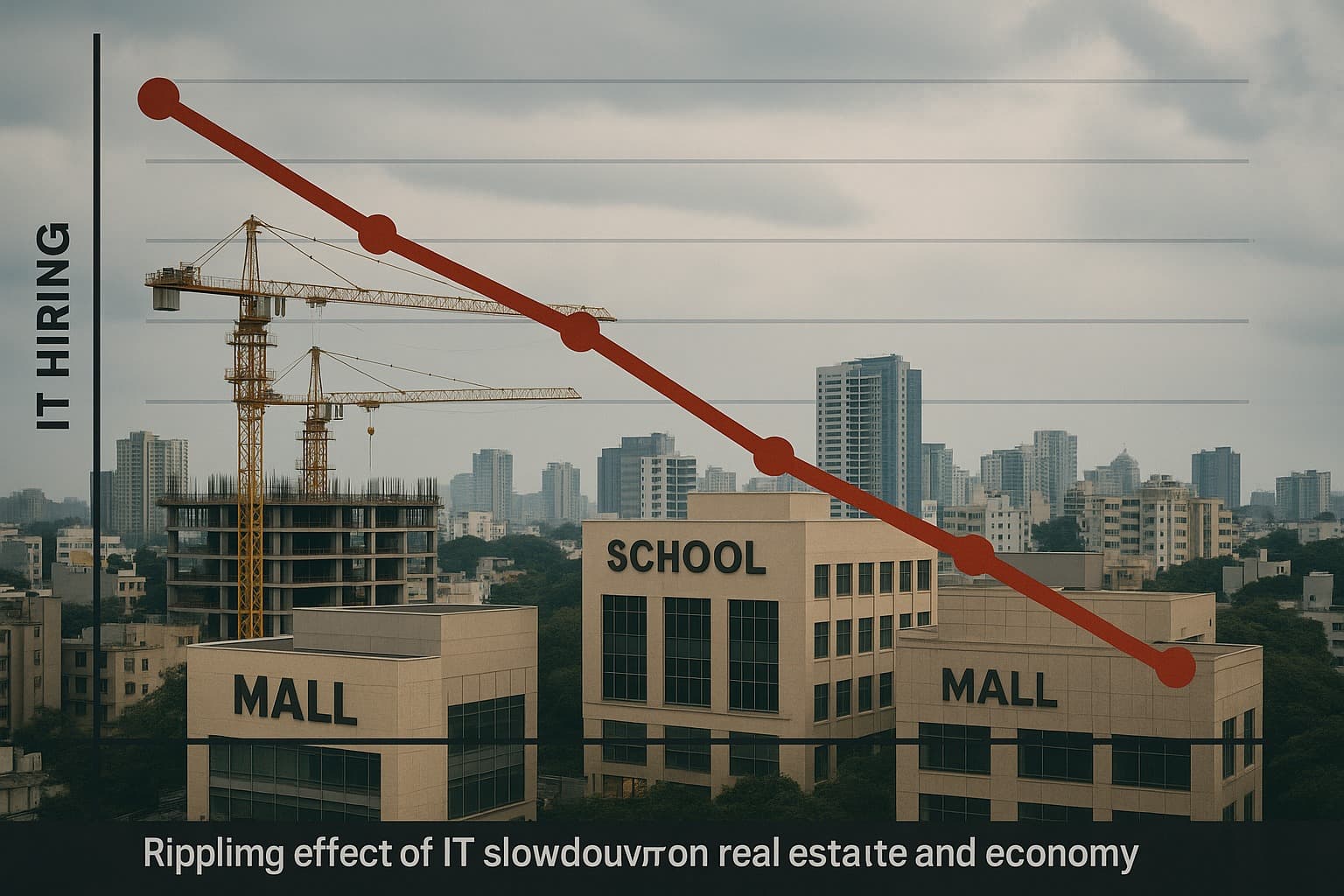Bengaluru Real Estate and IT Salaries: A Symbiotic Growth Story
Summary
Bengaluru's real estate is fueled by IT salaries, driving property demand and investment. Rising tech salaries increase affordability, while strategic infrastructure projects enhance accessibility, making Bengaluru a prime real estate destination.

Bengaluru: India’s IT Capital and Real Estate Magnet
Bengaluru, often hailed as the Silicon Valley of India, has long been synonymous with innovation, start-ups, and the IT industry. But beyond the tech parks and coding marathons, there’s another narrative quietly shaping the city: the booming real estate sector. Netizens and market experts alike are increasingly pointing out a simple truth—Bengaluru’s property market growth is intrinsically linked to IT salaries. Every hike in software engineer pay, every new recruitment drive in the tech corridors, reverberates through property prices, rentals, and investment opportunities across the city.
How IT Salaries Influence Property Demand
Buying Power of IT Professionals
At the heart of Bengaluru’s real estate surge is the purchasing power of its IT workforce. Engineers, developers, project managers, and tech consultants are not just job holders—they are aspirational homebuyers. With competitive salaries, signing bonuses, and stock options becoming common, IT professionals can afford premium apartments, gated communities, and even luxury villas.
The result? Areas around Whitefield, Electronic City, Sarjapur Road, and Hebbal have witnessed skyrocketing demand. Developers notice that properties near IT hubs tend to sell faster, often at a premium, compared to other city zones.
Rentals Driven by Tech Jobs
It’s not just purchases; rental markets are equally affected. Young IT professionals relocating for jobs need accommodation, and many prefer proximity to office locations to avoid long commutes. Consequently, rental yields in IT corridors are higher, attracting investors who want steady income alongside property appreciation.
Salary Hikes and Real Estate Prices
Every annual salary revision in the IT sector creates ripples in the property market. A 10–15% increase in average IT salaries often translates into higher budgets for homes. People who might have settled for a 2BHK may now stretch to a 3BHK in a gated community, while couples with dual incomes aim for more premium options. Essentially, rising IT salaries expand the market size and create room for mid to high-end real estate growth.
Investment Perspective: IT Salaries as a Real Estate Indicator
Predictable Market Trends
Investors are keenly aware of the correlation between IT growth and property appreciation. Bengaluru’s tech ecosystem provides a reliable barometer. When IT companies announce expansions, campus developments, or salary hikes, property consultants anticipate a surge in demand. Investing near such hubs is not just a gamble—it’s a calculated move based on predictable economic behavior.
High ROI Areas

Neighborhoods like Whitefield, Marathahalli, Electronic City, Sarjapur, and Outer Ring Road are often first on investors’ radars. The reasoning is straightforward: where IT employees go, housing demand follows. Short-term rentals, serviced apartments, and resale homes all enjoy a higher return on investment in these zones, especially if the properties are strategically close to tech parks and transit hubs.
IT Job Growth and Urban Migration
Migration Boosts Property Demand
Bengaluru’s IT boom attracts talent not just from Karnataka but from all over India. Cities like Delhi, Hyderabad, Chennai, and Pune see their professionals moving southward, increasing the city’s population density in tech-heavy areas. This migration translates into higher housing demand, more rental contracts, and an ever-growing need for both affordable and premium housing.
Family-Oriented Housing
As more IT employees relocate with families, demand for family-friendly homes rises. Gated communities with schools, parks, and healthcare facilities are particularly popular. Developers notice that projects tailored to IT professionals’ lifestyles—modern amenities, fitness centers, smart home features—sell faster than traditional housing options.
Government and Infrastructure’s Role
Supporting Real Estate Through IT Growth
The Karnataka government recognizes the symbiotic relationship between IT salaries and real estate. Investments in metro connectivity, road expansions, and IT corridors directly impact property value. For instance, the Namma Metro expansions connecting Whitefield and Outer Ring Road have enhanced accessibility, making commuting easier and driving up both rental and sale prices in these areas.
Policies Encouraging IT Housing
Affordable housing schemes, tax benefits, and approvals for IT-centric townships encourage developers to cater to this workforce. This ensures that Bengaluru remains competitive as a destination for tech talent while stabilizing real estate supply and demand.
Challenges Amid Rapid Growth
Affordability Concerns
Even though IT salaries are growing, rapid property price appreciation sometimes outpaces salary hikes. For mid-level employees, especially those in start-ups or smaller IT firms, the rising prices pose challenges. Balancing affordability and lifestyle becomes a delicate act for both buyers and developers.
Traffic and Commute
While salaries empower employees to afford premium homes, Bangalore’s notorious traffic can diminish the appeal of distant properties. Proximity to tech parks remains a key factor, even if it means paying more for a smaller flat closer to work.
Market Volatility
The real estate market is sensitive to tech sector fluctuations. Layoffs, slowdowns, or changes in IT hiring trends can have immediate effects on property demand and rental rates. Thus, investors often monitor IT sector announcements closely before making purchases.
Future Outlook: What Netizens Predict

Bengaluru’s connection between IT salaries and real estate isn’t slowing down. Netizens on forums, social media, and property portals highlight several trends:
IT salary hikes will continue to fuel property purchases.
Rental demand in IT corridors will remain robust, especially for premium and semi-luxury flats.
Investments near tech parks promise steady appreciation.
Family-oriented gated communities with amenities will remain a top choice for relocating employees.
In essence, Bengaluru’s real estate sector is not just surviving—it’s thriving, powered by the city’s dynamic IT industry. Every tech expansion, salary increment, or corporate relocation creates ripples that directly influence where people live, how much they pay, and how investors see value.
Conclusion
The symbiotic relationship between Bengaluru’s real estate and IT salaries is clear and powerful. IT professionals’ purchasing power drives both property sales and rentals, shaping city growth patterns and investor strategies. Government infrastructure projects and supportive policies further amplify this effect. While challenges like affordability and traffic remain, the overall outlook is optimistic. For homebuyers, investors, and developers, Bengaluru’s IT-driven property market offers both opportunity and stability, making it one of the most attractive real estate landscapes in India in 2025.
Summary (100 Words)
Bengaluru’s real estate growth is intricately linked to the IT sector and rising salaries. Tech professionals drive both property purchases and rental demand, particularly in key corridors like Whitefield, Sarjapur, and Electronic City. Salary hikes increase affordability and expand the market for mid to premium housing, while investors benefit from predictable returns in IT-adjacent areas. Government infrastructure projects and policies further enhance property accessibility and value. Despite challenges like affordability and traffic congestion, the connection between IT jobs and property demand ensures sustained growth. For buyers and investors, Bengaluru remains a top destination for real estate opportunities in 2025.
